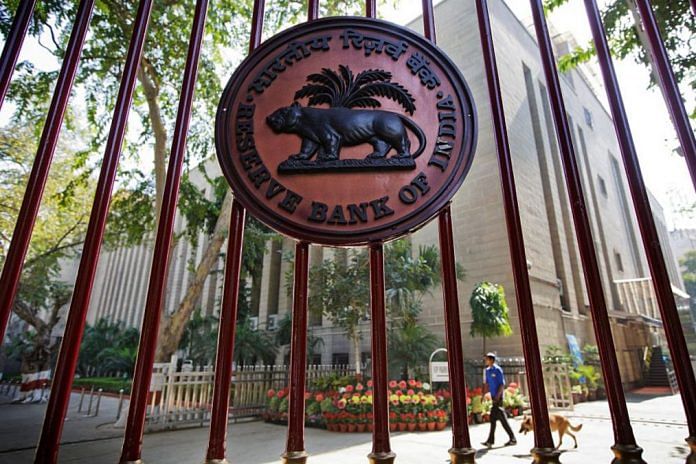The meeting follows an unprecedented standoff between RBI & Modi government. It’s being keenly watched by investors & policymakers.
New Delhi: Rarely has a board meeting of the Reserve Bank of India (RBI) aroused such curiosity.
Monday’s meeting, which comes after an unprecedented standoff between the RBI and the government, has been a topic of discussion for days, and will be closely watched by policymakers and investors in the country and outside.
There has been talk of invoking Section 7 of the RBI Act, 1934, which allows the government to direct the central bank in several areas.
“The meeting will be monitored, as it is about the autonomy of the central bank. This is why it has assumed such importance,” an RBI official said.
The board, unlike at other times, is not expected to discuss routine issues.
Issues that will be discussed
Credit flow: The RBI board will take up issues relating to lending norms for banks and the liquidity scenario, especially for critical sectors, including micro, small and medium enterprises, which are currently cash-starved.
The board, sources said, is expected to have a detailed discussion on this, and members representing the government are set to put pressure to ease lending norms to increase credit flow into the system.
The RBI had imposed stringent provisioning norms after the huge rise in non-performing assets (NPAs). As many as 11 banks have been put under prompt corrective action (PCA), which restricts these lenders from carrying out usual activities, including lending. The government wants these norms to be relaxed.
Companies have also expressed concern over the 12 February circular of the RBI, which stated that even if the borrower delays payment by one day, the asset should be seen as stressed, and lenders would be required to begin resolution of those assets.
Payment of larger chunk of RBI surpluses: Another critical issue, which has been widely talked about, is the payment of RBI’s surpluses to the government. Under Section 47 of the RBI Act, the central bank is supposed to transfer its surpluses after making provisions for its own expenses. RBI has reserves of 25 per cent of its total assets. Many policymakers feel that the level should not be more than 17-18 per cent.
Recently, S. Gurumurthy, a government-appointed director on the RBI board, said most central banks do not have such large reserves.
Section 7: This is another area of dispute, as the government has initiated talks on invoking this section. It gives power to the government to directly give instructions to the RBI for lending, and other areas which are of public interest.
Also read: RBI and Modi govt are set for a Monday face-off
Importance of this meeting
Trouble between the RBI and the government has been brewing for months. In February, finance minister Arun Jaitley blamed the RBI for the Nirav Modi-Mehul Choksi fraud at the Punjab National Bank. RBI governor Urjit Patel hit back, saying it had no power to discipline banks.
Last month, RBI deputy governor Viral Acharya lashed out at the government, saying it was trying to undermine the authority of the central bank. In a speech, he said that this could lead to grave consequences.
The RBI so far has refused to give in to pressure from the government, which has been seeking easier lending norms for the banks. The government has also shown its unhappiness over the 12 February guideline on stressed assets.
The growing rift between RBI and the Centre has led to a near-breakdown situation. There have also been reports that governor Patel would quit if the government continued to put pressure.
The finance ministry had to issue a statement underlining its commitment to the RBI’s autonomy.
Gurumurthy’s speech
Gurumurthy, who was appointed RBI director by the government just a few months ago, is also the co-convener of the RSS-affiliated Swadeshi Jagran Manch. The SJM has pointed out that the RBI cannot function in isolation and has to work in accordance with the government, which is answerable to the people.
Last week, Gurumurthy, known for his conservative economic views, hit out at the RBI for imposing stringent one-time provisioning norms for banks to cover for their bad assets.
He said India was a bank-driven economy, and restricting banks from carrying out their usual activities would lead to disastrous consequences.
Also read: Modi govt said to have proposed changing rules to closely supervise RBI
RBI board composition
The RBI board, at present, has 18 members, including governor Patel and four deputy governors — N.S. Vishwanathan, B.P. Kanungo, Mahesh Kumar Jain and Acharya.
Economic affairs secretary Subhash Chandra Garg and financial services secretary Rajiv Kumar are the government nominees. Besides, there are directors from various areas of the financial sector.
The board meets from time to time to discuss various issues relating to the banking industry and other economic indicators. These meetings rarely make headlines.




Thanks for educating viewers. Matter of disputes need to be solved in the overall interest of poor and marginalized by enriching MSME through financial benefits to run their industries.
Prof(Dr) Sudhir Das Retired Technocrat & now Visiting Prof at Kolkata. India
Let’s face it: this government hasn’t displayed great sagacity in money matters in last five years. It has proved “impulsive”, to say the least. If RBI Governor feels that loosening the purse strings will make RBI weak, and vulnerable to changes in world financial markets, then he should plainly REFUSE TO OBLIGE. Who knows, this dispensation might only be interested in “kicking the can” beyond the 2019 elections! If printing money is disallowed by some law that was enacted in 2002 (under Vajpeyi government), then this government has the power to amend or repeal that law. It’s not RBI’s job to answer why the government does not want to exercise its power. RBI’s job is to protect family wealth, and not to fund the “visions” of the more adventurous members of the family!